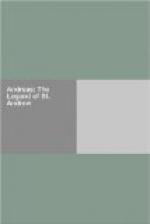“One and eternal is the God who rules
O’er all created things; throughout the earth
His might and His dominion far and near
Are magnified. His glory over all
Shines on His saints in heavenly majesty 1720
Among the angels now and evermore
In splendor fair. He is a noble King!”
NOTES
38 f. Lit. “hay and grass oppressed them.”
298. Reading [=a]ra with Grein.
368. The MS. says h[=i]e (they), with change of subject; for the sake of clearness I have kept Andrew as the subject.
424. Reading sund with Grein.
592. Adopting Siever’s reading, r[=e]onigm[=o]de (Beitr. X, 506).
656. “another house”; I am at a loss to explain this apparent inconsistency.
713. That there are two images is shown by the Greek.
719. I omit is. The passage as it stands is meaningless.
746. Reading g[=e] mon c[=i]gaeth, with Cosijn.
826. Lit. “’Till sleep came o’er them weary of the sea”; but Andrew is already asleep. The line is probably corrupt.
828. Something is apparently missing, though the MS. shows no break. Without attempting an emendation I have supplied: “bade him seek,” as completing the obvious sense.
1024. At this point a page is missing in the manuscript. It must have corresponded to the end of Chap. 19 and to Chap. 20 of the Greek, in which Andrew and Matthew exchange short speeches, after which Andrew utters a long tirade against the Devil as the author of this woe. I have omitted lines 1023^b, 1024, and 1025, which are meaningless without what has been lost.
1035. The number of men is uncertain. According to the Greek it is 270, but the Homily says 248. The manuscript reads: “two and a hundred by number, also forty,” but l. 1036 is evidently deficient. Wuelker emends to swylce seofontig. This is unsatisfactory, since the line is metrically deficient, and since, moreover, the regular word for seventy is not seofontig, but hundseofontig. Without venturing an emendation, I have taken the number 248 from the Homily, as being nearer the manuscript than the 270 of the Greek. This similarity is an additional argument for a common Latin original of the poem and the Homily.
1212. The poet has neglected to mention the circumstance, clearly stated in the Greek, that Andrew was still invisible both to the Devil and to the Mermedonians. This makes clear several passages, i.e., ll. 1203, 1212, 1223 f.
1242. Reading untw[=e]onde with Grein and Cosijn. 1276. I have here omitted two half-lines, of which the sense is very obscure. Grein connects lifrum with Germ. liefern="to coagulate” (cf. Eng. loppered milk), instead of assigning it to lifer="liver,” but this interpretation is not very satisfactory. See also Cosijn’s note (Paul und Braune’s Beitraege, XXI, 17).




